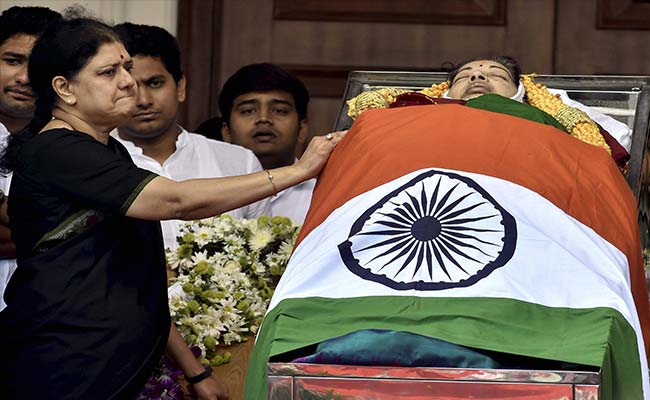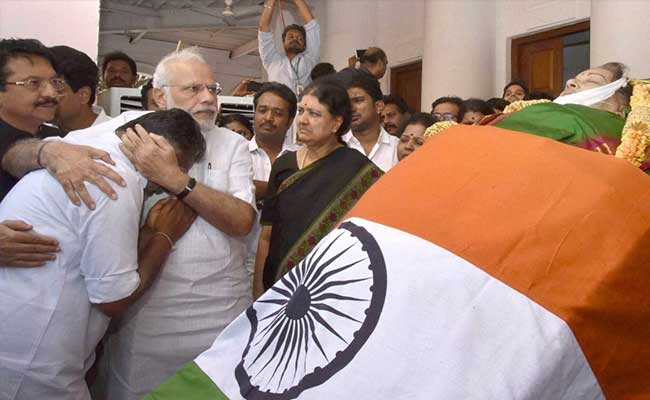In the event, commentators have been surprised by the smooth transfer of power and the dignified and respectful response of both mourners and opposition politicians alike. Within hours of Jayalalithaa's death being announced, her trusted lieutenant O Panneerselvam was anointed as party leader and, despite crowds of distraught supporters queuing to pay their last respects, the violence that was feared did not materialise. Despite this, it is no exaggeration to state that the death of the four-time Chief Minister leaves a vacuum at the heart of her party and in the centre of Tamil politics. All decision-making power and responsibility in the AIADMK were centralised in Jayalalithaa, and she frequently shuffled ministers and parliamentary candidates to keep them on their toes and prevent the emergence of rivals. Panneerselvam, thus, has inherited the leadership less due to his own merits and more because Jayalalithaa trusted him to hold the fort in her absence. His blind loyalty (when asked to stand-in during Jayalalithaa's stint in prison, he was reluctant even to occupy her chair) may endear him to the party faithful, but does not mean that he will be a dynamic or successful leader. Indeed, in his earlier periods as Chief Minister, he was seen as a puppet. What then does the future hold for the AIADMK and for Tamil politics more generally?

Sasikala Natarajan, Jayalalithaa's closest aide, performed her last rites at Chennai's Marina Beach
Aside from such political issues, the elevation of Sasikala alongside Panneerselvam is sensitive on caste grounds. Both Jayalalithaa and her main rival, DMK leader Karunanidhi, reached out to Tamils of all castes and creeds in part because they themselves hailed from minority communities. Jayalalithaa gained a reputation for being a patron of the dominant caste Thevar (or Mukkulathor) cluster, but programmatic politics and shrewd political appointments allowed her to transcend caste boundaries. Both Sasikala and Panneerselvam are Thevars, however, and it is hard to see how members of other castes in the party - let alone the public - would welcome such a scenario. The AIADMK at present has a slim majority that it will wish to preserve. Accordingly, few legislators will seek to rock the boat in the short-term, but a Sasikala-Panneerselvam combination is likely to increase the chance of defections and schisms in the medium to longer term. The party would also be reliant on two figures whose primary qualification would be their closeness to Amma and who would depend on the party name and a sympathy wave to succeed. The centralisation of the party under Jayalalithaa gave her scope to direct it, but means that there is no obvious replacement.

Tamil Nadu Chief Minister Panneerselvam breaks down at memorial for J Jayalalithaa
Elsewhere, smaller parties in Tamil Nadu have been marginalised by the two Dravidian giants and have - for many years - been reduced to planning ahead for problems in the Dravidian duopoly. Despite this, none of the state-based outfits seem well placed to benefit. Misplaced electoral calculations mean that none have elected representatives in the Legislative Assembly nor Members of Parliament with the standing and publicity to seize the limelight. Parties like the Vanniyar-dominated Pattali Makkal Katchi or PMK, the Dalit-led Viduthalai Chiruthaigal, the Communists, or film-star Vijayakant's DMDK may be better placed to win seats if the popularity, standing and credibility of Jayalalithaa and Karunanidhi fails to translate into votes for their successors, but none look like credible challengers. Likewise, national parties like the Congress and BJP will hope to make inroads in the state at this point, but neither have the grassroots strength nor organisation to mount meaningful campaigns for power. For all the problems of corruption and dynastic politics, parties in Tamil Nadu have delivered key benefits and welfare measures. Jayalalithaa's populism in part reflects her strength of character, but also reflects the mix of welfare and patronage. The bargaining power of national parties will increase as less experienced leaders seek alliances, but the fault-lines of Tamil politics look set to revolve around the Dravidian parties under new leadership.
(Hugo Gorringe is senior lecturer in Sociology at the University of Edinburgh)
Disclaimer: The opinions expressed within this article are the personal opinions of the author. The facts and opinions appearing in the article do not reflect the views of NDTV and NDTV does not assume any responsibility or liability for the same.


